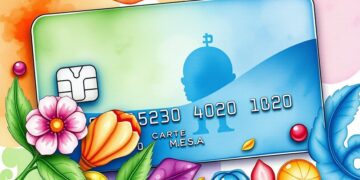The Effects of Credit Card Interest Rates on Financial Health

Understanding Credit Card Interest Rates
Credit card interest rates can significantly impact your financial health. An understanding of how these rates function is essential for maintaining control over your finances. Here are key points to consider:
- High-interest rates can lead to accumulating debt.
- Late payments may increase your APR (Annual Percentage Rate).
- Balance transfers often come with their own fees and rates.
Many people underestimate how these factors can affect their overall financial situation. When credit card interest rates soar, individuals may find themselves trapped in a cycle of debt. For example, if you carry a balance of $5,000 on a credit card with a 20% interest rate, you could end up paying over $1,000 just in interest if you take a year to pay it off. To avoid this, it’s crucial to stay informed and take proactive steps.
Practical Steps to Manage Credit Card Interest Rates
Understanding the implications of credit card interest rates can help you enhance your financial stability. Here are some immediate actions you can take:
- Monitor your credit card statements regularly. This practice helps you track your spending and make timely payments.
- Consider making at least the minimum payment on time. This not only prevents penalties but also helps maintain your credit score.
- Look for credit cards with lower interest rates. Research and compare different credit card offers, focusing on those with 0% introductory APRs or lower ongoing rates.
Being proactive can make a significant difference in your financial journey. For instance, if you consistently pay your balances in full, you’ll avoid interest charges altogether. Additionally, consider setting up automatic payments to ensure that you never miss a due date, thus safeguarding your credit score from being negatively impacted.
If you’re already facing high credit card debt, exploring balance transfer options may be a strategic move. While these often come with fees, transferring a high-interest debt to a new card with a promotional low or 0% APR can save you money in the long run. Just be cautious about any terms and conditions associated with these transfers.
In summary, by recognizing the influences of credit card interest rates and implementing these practical tips, you can create a more stable financial future. Staying aware of your options allows you to make informed decisions that contribute to your economic well-being. Efficient management of these rates is vital for avoiding debt traps and enhancing your overall financial health.
DIVE DEEPER: Click here to discover the pros and cons
The Impact of High Interest Rates on Debt Accumulation
One of the most alarming effects of high credit card interest rates is the rapid accumulation of debt. When interest rates are elevated, the cost of borrowing becomes significantly more burdensome. As a result, individuals who carry a balance may find it increasingly challenging to pay it off, leading to a cycle of debt that feels impossible to escape. Here’s how you can better understand and mitigate these challenges:
- Calculate your effective interest costs. Begin by determining how much interest you pay each month on your outstanding balance. Use an online calculator or apply the formula: balance x APR/12. This will give you insight into how much you’re really spending.
- Focus on reducing your principal. Prioritize paying down your principal balance rather than making only minimum payments. This will lessen the amount of interest accrued over time.
- Avoid new charges while paying down existing debt. Each new swipe adds to your balance and increases the accrued interest, making it even harder to repay your debt.
Moreover, the implications of carrying high-interest debt extend beyond just monthly payments. For many, paying just the minimum creates a situation where a significant portion goes towards interest, rather than reducing the principal owed. This can lead to extended repayment times and financial stress. In fact, consider that if you have a balance of $10,000 with a 22% APR and only pay the minimum of $250 a month, it could take almost 5 years and cost you over $3,000 in interest alone to pay off your debt.
Developing a Payment Strategy
To combat the negative effects of high interest rates effectively, developing a clear credit card payment strategy is essential. Follow these steps to formulate a plan:
- Create a budget. Outline all your income and essential expenses. This clarity allows you to determine how much you can allocate towards paying off your credit card debt.
- Set specific goals for repayment. Aim to pay off a certain percentage of your balance each month or establish a timeline for complete repayment.
- Consider the avalanche method. Focus on paying off the card with the highest interest rate first while maintaining minimum payments on other cards. This method is often more effective in reducing overall interest costs.
By adopting a disciplined approach to managing credit card payments, you can significantly lessen the financial burden associated with high-interest rates. While it may require effort and sacrifices, the long-term benefits will lead to improved financial health and stability. Awareness of how interest rates affect your overall financial landscape can empower you to make informed decisions that will pay off in the future.
DIVE DEEPER: Click here to explore the cultural influences on financial choices
Understanding the Long-Term Consequences of High Interest Rates
Beyond the immediate effects of high credit card interest rates, there are long-term consequences that significantly impact financial health. Individuals who fail to manage their credit card debt effectively may discover that their credit scores deteriorate, leading to higher costs for future loans or credit. Furthermore, high-interest debt can affect a person’s ability to save for future goals such as a home, retirement, or education. Here are some essential considerations regarding these long-term repercussions:
- Track your credit score. Regularly check your credit score to understand how your credit card utilization impacts it. Utilize free services provided by credit bureaus or other financial platforms, which will help you spot any drops in your score.
- Assess your debt-to-income ratio. This ratio compares your total monthly debt payments to your monthly gross income. A high ratio may hinder your chances of getting approved for new loans, ultimately limiting your financial options.
- Recognize the implications on your future borrowing. Higher credit card debt may trigger higher interest rates for personal loans, auto loans, or mortgages. Understand how these increasing costs can accumulate over time.
Another consequence of high credit card interest rates is the potential psychological impact on borrowers. The stress associated with debt can lead to anxiety and impact overall well-being. The constant worry about making payments can deter individuals from engaging in financially rewarding activities, such as investing or pursuing further education. Consider these actionable steps to improve financial resilience in the face of such stress:
Cultivating a Savings Mindset
Developing a savings mindset is crucial for overcoming the negative effects associated with high credit card interest rates. Here’s how to build this mindset effectively:
- Establish an emergency fund. Aim to save at least 3-6 months’ worth of living expenses. This fund can provide a financial cushion, reducing reliance on credit cards in emergencies.
- Automate your savings. Set up automatic transfers to your savings account right after you receive your paycheck. This “pay yourself first” philosophy can help you prioritize savings over spending.
- Explore rewarding savings accounts. Look for high-yield savings accounts or money market accounts that offer better interest rates, helping your savings grow faster.
Lastly, consider how debt can affect your mental and emotional health. Ongoing financial stress can result in decreased productivity at work and strained personal relationships. To tackle this, engage in the following practices:
Practicing Financial Mindfulness
- Set realistic financial goals. Break down repayment and savings goals into manageable steps that prevent feeling overwhelmed.
- Seek financial education resources. Utilize online courses, books, or workshops to enhance your understanding of personal finance, which may alleviate anxiety by empowering you with knowledge.
- Consider professional advice. If debt becomes unmanageable, reaching out to a certified financial advisor can provide tailored strategies to tackle your specific situation effectively.
By understanding the long-term consequences of high credit card interest rates and adopting practical strategies to foster financial well-being, individuals can work toward improved financial health. This proactive approach will ultimately provide more security and opportunities in the future.
DIVE DEEPER: Click here to uncover more insights
Conclusion
Understanding the effects of credit card interest rates on financial health is crucial for anyone looking to maintain or improve their economic well-being. As shown throughout this article, high-interest rates can lead to a **cascade of negative consequences**, including poor credit scores, increased debt burdens, and emotional stress. To mitigate these risks and secure a healthier financial future, individuals need to take proactive steps.
First, monitor your credit daily to stay informed about how your credit card usage affects your score. Regularly assessing your debt-to-income ratio will also provide insights into your overall financial picture and help avoid being overwhelmed by debt. Additionally, it is essential to recognize how high credit card debt can lead to increased costs for future borrowing.
To build a robust financial foundation, establish an emergency fund and automate savings to cultivate a habit of setting aside money consistently. Engaging in financial education through community resources or online courses can empower you to make informed decisions regarding your finances. Lastly, if you find yourself facing unmanageable debts, do not hesitate to seek help from a financial advisor for tailored strategies.
Ultimately, actively managing credit card usage and prioritizing financial literacy will not only alleviate the stress associated with high interest rates but will also open doors to **better financial opportunities** in the long run. A commitment to these steps paves the way for a healthier financial future.

Linda Carter is a writer and financial expert specializing in personal finance and financial planning. With extensive experience helping individuals achieve financial stability and make informed decisions, Linda shares her knowledge on the Take Care Garden platform. Her goal is to empower readers with practical advice and strategies for financial success.





